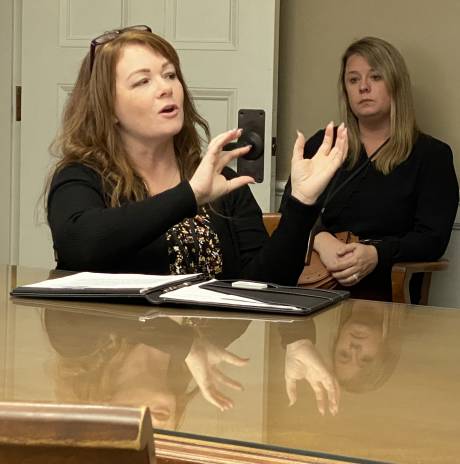
Once STAR ended its contract, Genesee County officials opted to fill in the gap by taking a STEP toward assisting at-risk youth.
Formerly the Student Transition And Recovery program, the county’s version will be similar, with the suggested name of Student Transition and Empowerment Program, which was outlined Monday by newly hired Social Services Department Commissioner Carla Mindler.
STAR had an ongoing contract for these services, and program leaders did not renew the contract, leaving a potential void that Social Services personnel was adamant to bypass. That will involve hiring full-time adolescent behavioral specialists I and II, and a full-time adolescent behavioral coordinator.
“As a behavioral specialist, one will be working directly with the at the at-risk youth in their homes and in their schools, mentoring, guiding them, assisting them, making sure that they're properly ready for school,” Mindler said to the county’s Human Services members in the Legislative Conference Room. “So we have money in the budget already this year for this work, we have an email out to the state to find out if we develop a program of our own, can we pay that under the same funding that we paid the STAR program … But with all the vacancies we've had this year, there's plenty of money in there to cover us for the rest of the year, unfortunately, because of the vacancies, but this will not affect the 2022 budget.”
There will be calisthenics in the morning and getting work done in the afternoon; a tutor, therapists and those behavioral specialists, if approved, she said. Staff will also have some administrative duties, including documented supervision of the specialist I if the coordinator is not present, and the coordinator would be responsible for complete oversight of the program.
Legislator John Deleo saw it as putting a youth back on track versus being derailed by the absence of such a hands-on program. There can be about 40 kids at any given time, Mindler said, with a total of close to 200 going through the program. The county would be employing many of the same people that ran STAR, which offers continuity for participants, Legislator Marianne Clattenburg said.
“It’s good for the children, good for the parents and good for us,” she said.
Clattenburg had asked how the program was categorized, and Mindler said it was a preventive program, within child welfare and prevention.
“I’m so happy you picked it up, it’s so valuable,” Clattenburg said.
Once the full county Legislature votes with an expected approval, the program will be submitted to the state for final approval and details about funding. Mindler was confident the program would soon be addressing at-risk youth.
“I think we’ll be up and running to a certain extent,” Mindler said.
Each county school district that wants to participate — and most have up to now — will pay a flat rate per student, signaling each district’s investment in at-risk behavioral work. Legislative Chairwoman Shelley Stein was impressed with what’s been done so far.
“You’ve done a lot of work guys,” she said.
The Human Services Committee voted to forward on the request for a salary amendment for the Social Services Department to add on the three positions, to be effective immediately upon Legislature approval.
Since the STAR contract no longer exists, the new position salaries will have no impact on the county’s budget, the resolution states. State and federal reimbursements are expected to be from 66 percent up to 100 percent as determined by case-specific eligibility.
Photo: Social Services Department Commissioner Carla Mindler reviews a program to replace STAR, which addressed behavioral issues of at-risk youth before ceasing its contract this year. Photo by Joanne Beck.
